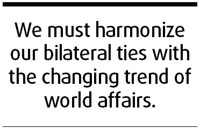Sino-Japanese ties vital to rise of Asia
By Feng Zhaokui (China Daily)
Updated: 2008-04-08 07:37
Updated: 2008-04-08 07:37
The recent "contaminated" dumpling incident cast a shadow over the improving bilateral ties between China and Japan after a sunny period symbolized by former Japanese Prime Minister Shinzo Abe's "ice-breaking visit" to China last year, Chinese Premier Wen Jiabao's "ice-thawing trip" to Japan, and current Japanese Prime Minister Yasuo Fukuda's "(China) visit to usher in another spring" in Sino-Japanese relations in December.
The incident also got us worried about China-Japan bilateral ties as we celebrated their revival.
Sino-Japanese relations have shown signs of positive development in the past year or so but are still very fragile and can be damaged by a sudden change in the political climate or sabotage by a few individuals bent on destroying the bilateral ties. The two neighboring countries are yet to establish basic mutual confidence, while the two peoples find a lack of trust between them.

The United Nations Intergovernmental Conference on Climate Change in November and a series of international meetings such as the Conference of Parties 13 on the same subject sounded the alarm over climate change and other environmental problems. The events also triggered profound changes in the trend of world affairs, but existing Sino-Japanese relations have been far from being able to adapt to such changes.
Both China and Japan, whose economic miracles have made them the envy of the world in recent history, are now both faced with unprecedented difficulties that neither can overcome on its own in order to proceed with their economic and social development. They must join hands immediately and cooperate with other Asian countries to remove such roadblocks together, but it is still very difficult to say whether the China-Japan relationship is ready for that level of cooperation.
The three visits by the heads of government of both countries have proved the current leaders of China and Japan are working hard to improve bilateral ties, because they know how important the growth of their relations are to keep their economic and social development going forward, to solve their own problems, and to maintain the stability of the region.
However, there is no quick fix to the lack of basic mutual confidence between the two countries, to educating the two peoples - nearly 1.5 billion in all - about the fact that further developing bilateral ties will contribute to their interests and to truly ending the lack of understanding and mutual trust.
Some Japanese media entities used the "contaminated" dumpling incident to instill the idea that all food imported from China is unsafe by blowing up an isolated incident out of all proportion.
China is the nearest major agrarian country to Japan, where food self-sufficiency is 39 percent today. Japan may be able to take food self-sufficiency a step further but most certainly never to 100 percent, which means it has to import.
It is only logical for Japan to import farm produce from China in huge quantities in this era of globalization. And China has always attached great importance to the quality of farm produce and processed food exported to Japan. According to statistics released by Japan's Ministry of Health, Labor and Welfare in 2007, China is not one of the top 10 food exporting countries in terms of the sub-standard rate (0.09 percent among imports from China and 0.12 percent from the United States). Needless to say Japan too cannot guarantee its own farm produce and processed food are "absolutely safe".
If Japan uses the dumpling incident as an excuse to fan nationalist sentiment and stymie food imports from China, both countries stand to lose.
Apparently some people in Japan believe China's reconciliatory policy toward Japan is "the greatest threat" and the improvement of bilateral ties upsets them. In response to what those people have done so far, I think we should show the Japanese public more convincing reasons why our bilateral relations need improvement, such as the fact that the ties do not just concern the two nations but the whole world as well. And we must harmonize our bilateral relationship with the changing trend of world affairs.
In my opinion, logic tells us that we should use the slogans "save our planet" and "protect the environment" to foster closer ties as issues such as climate change become more acute and threaten our health and even the very elements for simple survival (air and water).
This will no doubt become a rallying cry for all peoples of the world and motivate us to take action so as to make globalization healthier and more sensible, and turn multipolarization into a constructive rather than a destructive force.
But, because of limitations to the market economy and the deep-rooted "supremacy of national interests", which cannot be removed overnight, this process will take time. It is up to all peoples of the world, and the knowledgeable ones in particular, to shorten it.
To realize economic globalization, regional integration is probably the most effective and rewarding way today. The European Union (EU) has been the most successful compared to other regional communities in this respect.
China and Japan should learn from the EU and work together to push forward regional cooperation in Asia, which requires abandonment of the childish obsession with "who's the boss". The EU has been successful because it was not based on "one-nation domination" but developed around the "coal-steel joint management" agreement between France and Germany back in the 20th century.
Developing Sino-Japanese relations is of great importance to the establishment of an East Asian regional community. If the two countries do not get along, they will not be the only ones to suffer, all Asian nations can forget about "the rise of Asia" they have been looking forward to.
The author is a researcher with the Institute of Japanese Studies under the Chinese Academy of Social Sciences
(China Daily 04/08/2008 page8)
|
|
|
|